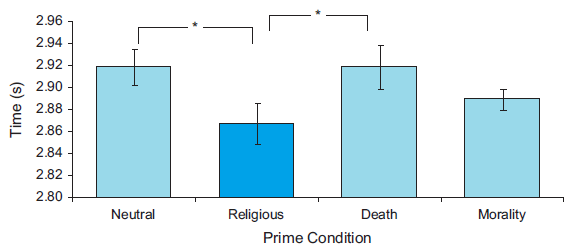Kevin Rounding (Queen’s University, Ontario, Canada) has run a series of experiments which suggest that religious beliefs can actually boost your ability to stay focussed and resist temptation.
For example, they found that students primed with religious thoughts were able to drink more cups of a disgusting orange juice/vinegar blend (they were offered 5c for every 25 mL they drank).
Religiously primed students were also more likely to put off receiving a reward of $5 now, in order to receive a larger reward in the future. This is known as ‘delayed gratification’, and is an important indicator of whether people can achieve goals and carry out long-term plans.
In another study, they wore out their students brains by giving them a typing task for which they had to concentrate very hard – while loud music was pumped out at them! Those students who were subsequently primed with religion kept plugging away longer at the next task.
In the last study, they get their students to do the Stroop Test. This is a test where the subjects are shown colour words (“red”, “blue” etc) that are themselves written in different colours. The challenge is to say what the colour of the text is, and ignore the actual word.
The idea behind this test is that quicker answers suggest more focused control. And this test also gets away from one possible criticism of the previous studies – that they are measuring adherence to some kind of social expectation, rather than self-control per se.
Sure enough, priming with religion decreased response times, while priming with moral concepts or with death concepts had no effect (as shown in the graphic).
Now, all this chimes with previous research which found that priming with specific god concepts (a controlling god, rather than a more hands-off god) can increase the ability to resist temptation while decreasing the drive to actually achieve important life goals.
And other research has shown that priming with god concepts can drive people to keep working away at impossible tasks.
However, I’m less convinced by the Stroop test in this study. Michael Inzlich (University of Toronto) has previously found that religious prompts make people less anxious about making mistakes on this test.
Perhaps in this study all that was happening was that people primed with religion made faster responses because they were less anxious about getting it wrong?
So are we seeing genuine effects on self-control, or just enhanced drive to fulfil social expectations? I don’t know, but either effect is pretty interesting!
Rounding, K., Lee, A., Jacobson, J., & Ji, L. (2012). Religion Replenishes Self-Control Psychological Science DOI: 10.1177/0956797611431987
 This article by Tom Rees was first published on Epiphenom. It is licensed under Creative Commons.
This article by Tom Rees was first published on Epiphenom. It is licensed under Creative Commons.














